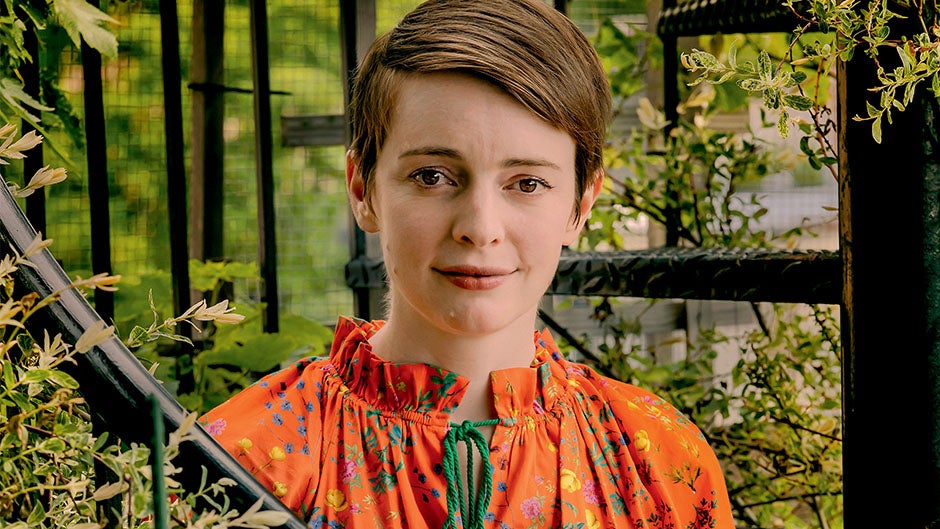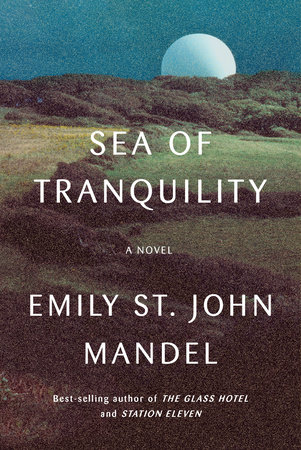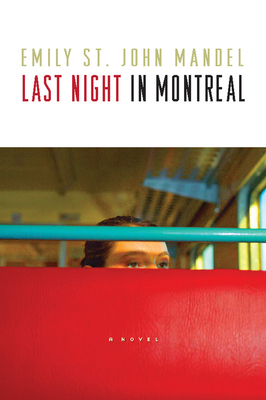Emily St. John Mandel
Author of 2014 National Book Award finalist Station Eleven and Sea of Tranquility

Photo Credit: Sarah Shatz
-
About Emily St. John Mandel
Emily St. John Mandel is the author of the critically acclaimed novel Station Eleven, a finalist for the 2014 National Book Award, as well as The Glass Hotel, which is a 2020 finalist for the Scotiabank Giller Prize. Mandel is the author of several other novels – Last Night in Montreal, The Singer’s Gun, and The Lola Quartet – all of which were Indie Next picks. In her lectures, Mandel captivates audiences with stories about her early writing career and her thoughtful reflections on writing literary fiction with the strongest possible narrative drive. A poised speaker whose works continue to grow in scale and ambition, Mandel is popular with colleges and universities, literary festivals, and libraries.
Emily St. John Mandel’s national bestseller Station Eleven is set in an eerie post-apocalyptic North America, twenty years after the initial collapse of civilization when culture was reshaping itself and defining a new normal. Sometimes terrifying, sometimes tender, Station Eleven tells a story about the relationships that sustain us, the ephemeral nature of fame, and the beauty of the world as we know it. Station Eleven has been adapted to an original series on HBO Max.
Her following novel The Glass Hotel is an exhilarating novel set at the glittering intersection of two seemingly disparate events—the exposure of a massive criminal enterprise and the mysterious disappearance of a woman from a ship at sea. NBCUniversal International Studios is acquiring the rights to Mandel’s 2020 mystery thriller novel The Glass Hotel with plans to turn it into a TV series by Lark Productions, with a screenplay written by Mandel.
Emily St. John Mandel returns with Sea of Tranquility, a novel of art, time, love, and plague that takes the reader from Vancouver Island in 1912 to a dark colony on the moon five hundred years later, unfurling a story of humanity across centuries and space.
Emily St. John Mandel was born in British Columbia, Canada. She is a staff writer for The Millions, and her work has appeared in numerous anthologies, including The Best American Mystery Stories 2013 and Venice Noir. She lives in New York City with her husband.
Contact us about booking Emily St. John Mandel for your next event.
-
Speaking Topics
Station Eleven
This lecture is a discussion of Emily St. John Mandel's bestselling book—the process of writing it and the research that went into it. The audience will be transported into the pages of Mandel's spellbinding novel as she discusses notes on the end of the world, the history of pandemics, and the impact of the bubonic plague on Shakespeare's life and work.
A Look at the Craft
In this lecture, Emily St. John Mandel talks about her craft of writing and structuring non-linear novels, including examples and analysis of non-linear structures in other writers' works. Mandel will also discuss the process of writing literary fiction that flirts with genre and where she finds inspiration for her work.
-
Video
-
Praise for Emily St. John Mandel
She was amazing, and very considerate to the audience. She signed every book and took lots of pictures with her readers.
— City of Las Vegas | Department of Parks, Recreation & Cultural AffairsEmily did fantastic! She was approachable, incredibly generous with her time, and easy to work with in every way. We have had countless messages from attendees about what a great event it was.
— Gaines Center for the Humanities at the University of KYEmily was fantastic! She is smart, thoughtful, engaging, and honest. Our students and community members were all in awe of her answers to the questions she was asked. She stayed to sign every single person’s book as well, which meant a lot to the attendees.
— University of MontanaEmily’s reading and subsequent conversation with Sequoia Nagamatsu was wonderful, and very enthusiastically received. Many comments both overheard and posted online said that this was the best Unbound keynote they had ever attended. I was especially grateful that Emily was so patient and gracious with the many, many people who wanted their book signed after the event, and that after that very long line finally ended, she happily signed several hundred more books for Skylark Bookshop. She was an absolute delight to welcome to Unbound and we are so grateful to her.
— Unbound Book FestivalShe was so wonderful. The audience was thoroughly engaged and we’ve heard incredible feedback so far.
— Middlebury CollegeEmily was wonderful and so generous with her time. The feedback we’ve heard so far from participants was how much they enjoyed the conversation format mixed with readings. Our students appreciated the opportunity to have lunch with Emily and talk with her in a more intimate space.
We also had a large mix of people from the community and campus (students, faculty, and staff) which spoke to how widely Emily’s work is read and appreciated across our community.
— Western Illinois UniversityEmily was fantastic. We have been inundated with compliments since the event ended.
— Des Moines Public Library“Emily’s talks with interviewer Marianne Combs could not have gone better. Our crowds delighted in every intertwined detail about Station Eleven, The Glass Hotel, Sea of Tranquility, and their various adaptations to film and TV. Emily is frank, open, and an easy conversationalist, who somehow makes being an incredibly talented writer seem effortless. What a talent!”
— Friends of the Hennepin County LibraryThank you so much for your support in organising such a terrific event. It was a huge success; the twenty participating schools were honoured to be in a (virtual) audience with Emily. Students and teachers alike were completely engrossed by her insights, poise and eloquence.
— Star of the Sea College, Brighton, AustraliaWe couldn’t be more thrilled working with Ms. Mandel. She was personable, friendly, articulate, professional, engaging and entertaining. The event on stage was spectacular. There were approximately 200 people. They were on edge of their seats.
— St. Charles Public LibraryEmily was gracious and insightful, and the bit of chatter we’ve been able to pick up since has been highly positive. The discussion onstage itself was fantastic. Ms. Mandel was candid and insightful in answering questions about her book. She’s clearly been on the circuit for a while, and I’ve seen too often an author come across as jaded or bored. This was not the case last night, and our onstage discussion was lively, animated, and engaging. Some of the cooler conversations came during the book signing, where students were able to engage more directly. Here, Ms. Mandel was just a lovely, generous interlocutor. We couldn’t have been happier.
— West Virginia UniversityOur event was a huge success! Our onstage conversation with Emily was just what we were hoping for… she was thoughtful, hugely articulate, open, accessible, and funny. She was very gracious with our two student interviewers, and we really appreciated her being open to working with them. The dynamic between the three of them onstage was cordial and warm, and I think the students got even more out of the talk because our guest was having a conversation with two of their peers.
Many students commented that they loved Emily’s honesty and candor in the Q&A format. As an educator, I was so happy that our students were going to have access to a successful, talented female writer, and Emily proved to be an exceptional role model in person as well as on paper. I enjoyed meeting Emily and hearing her thoughts on Station Eleven and the writing process. She was easy to work with and generous of time and spirit. I’d recommend her as a visiting writer or speaker to anyone.
— Berkshire School… we were very happy with [Emily’s] visit…She was very gracious to our students and reactions to both her Q&A and the main evening event were positive across the board.
— University of St ThomasOur Summer Reading Event was wonderful. Emily St. John Mandel was a pleasure to meet and the students thoroughly enjoyed her lecture. Afterwards, the students were lined up waiting to have their books signed….
— Rutgers UniversityEmily St. John Mandel’s visit went wonderfully. We had a huge and enthusiastic crowd for the reading with a long line for the book signing afterward. Emily was a phenomenal speaker—insightful, gracious, and patient with our guests (student and community alike). We could not have asked for more.
— University of RichmondEverything came together beautifully! The students greeted her as if she was a rock star, her talk was interesting and spell-binding, followed by a good half-hour of eager questioning, all by students. There is no doubt in my mind that Emily’s demeanor and presence made the night. It was wonderful. She is very kind, and showed a lot of stamina and patience.
— St. Michael’s CollegePraise for Sea of Tranquility
I could write a thousand words about Emily St. John Mandel, and this book, and this moment but I won’t dare spoil it. Truly soul-affirming.
— Emma Straub, best-selling author of All Adults HereA spiraling, transportive triumph of storytelling – sci-fi with soul.
— Kiran Millwood Hargrave, author of The MerciesIn Mandel’s stunning latest, people find themselves inhabiting different places and times, from early 20th-century Canada to a 23rd-century moon colony… The novel’s narratives crystallize flawlessly. Brilliantly combining imagery from science fiction and the current pandemic, Mandel grounds her rich metaphysical speculation in small, beautifully observed human moments. By turns playful, tragic, and tender, this should not be missed.
— Publishers Weekly, starredA complicated and mysterious puzzle concerning the nature of reality solved perfectly, all loose ends connected… Even more boldly imagined than Station Eleven. Exciting to read, relevant, and satisfying
— Kirkus, starredA time-travel puzzle… Mandel’s prose is beautiful but unfussy; some chapters are compressed into a few poetic lines. The story moves quickly… In the end, the novel’s interlocking plot resolves beautifully, making for a humane and moving time-travel story, as well as a meditation on loneliness and love.
— BookPage, starredIf you loved Station Eleven and The Glass Hotel, you’ll devour this dystopian novel that’s about time travel and mystery as much as it is about love, the importance of family and how much our individual actions impact the world. With vivid and memorable characters, gorgeously imaginative settings and a plot that will have you gasping aloud, it ping-pongs from an eerie encounter in North America in 1912 to the anxiety of trying to escape a plague-ravaged Earth to moon colonies that feel at once just like home and far from it. This is a triumph of science fiction, so give it a try even if the genre usually leaves you cold.
— Good Housekeeping‘When have we ever believed that the world wasn’t ending?’ asks a character in Emily St. John Mandel’s Sea of Tranquility… At a time when that fear is so acutely alive, the question is revelatory. While Mandel focuses on many of the things that terrify us, she also illustrates how hope and humanity are flames that can never be fully extinguished
— —Adrienne Gaffney Elle“[The] feeling of something lovely glimpsed and lost is everywhere in these pages…In Sea of Tranquility, Mandel offers one of her finest novels and one of her most satisfying forays into the arena of speculative fiction yet, but it is her ability to convincingly inhabit the ordinary, and…project a sustaining acknowledgment of beauty, that sets the novel apart…Born of…empathy and hard-won understanding, beautifully built into language, for all of us who inhabit this ‘green-and-blue world’ and who one day might live well beyond.”
— Laird Hunt, The New York TimesPraise for The Glass Hotel
A wondrously entertaining novel… The Glass Hotel is never dull. Tracing the permutations of its characters’ lives, from depressing apartments in bad neighborhoods to posh Dubai resorts to Manhattan bars, Colorado campgrounds, and the Edinburgh Fringe Festival is like following the intricate patterns on Moroccan tiles. The pleasure, which in the case of The Glass Hotel is abundant, lies in the patterns themselves… This is a type of art that closely approximates life, and a remarkable accomplishment for Mandel… This novel invites you to inhabit it without striving or urging; it’s a place to be, always fiction’s most welcome effect.
— Laura Miller, SlateThe Glass Hotel may be the perfect novel for your survival bunker... Freshly mysterious... Mandel is a consummate, almost profligate world builder. One superbly developed setting gives way to the next, as her attention winds from character to character, resting long enough to explore the peculiar mechanics of each life before slipping over to the next... That Mandel manages to cover so much, so deeply is the abiding mystery of this book. The 300 pages of The Glass Hotel work harder than most 600-page novels... The disappointment of leaving one story is immediately quelled by our fascination in the next... The complex, troubled people who inhabit Mandel’s novel are vexed and haunted by their failings, driven to create ever more pleasant reflections of themselves in the glass.
— Ron Charles, The Washington PostThe question of what is real—be it love, money, place or memory—has always been at the heart of Ms. Mandel’s fiction... Her narratives snake their way across treacherous, shifting terrain. Certainties are blurred, truth becomes malleable and in The Glass Hotel the con man thrives... Lyrical, hypnotic images... suspend us in a kind of hallucinatory present where every detail is sharply defined yet queasily unreliable. A sense of unease thickens... Ms. Mandel invites us to observe her characters from a distance even as we enter their lives, a feat she achieves with remarkable skill. And if the result is a sense not only of detachment but also of desolation, then maybe that’s the point.
— Anna Mundow, Wall Street JournalAn eerie, compelling follow-up... not your grandmother’s Agatha Christie murder mystery or haunted hotel ghost story... The novel’s ongoing sense of haunting extends well beyond its ghosts... The ghosts in The Glass Hotel are directly connected to its secrets and scandals, which mirror those of our time... Like all Mandel’s novels, The Glass Hotel is flawlessly constructed... The Glass Hotel declares the world to be as bleak as it is beautiful, just like this novel.
— Rebecca Steinitz, The Boston GlobeEmily St. John Mandel has a knack for explosive openings… Mandel is constructing a sort of multiverse that demonstrates the power of fiction to imagine simultaneous realities.
— Josephine Livingstone, The New RepublicAn ephemeral quality permeates the novel… It’s a thrill when the puzzle pieces start to fit together… The final chapter is haunting, taking readers full circle… It’s a sense readers will enjoy as well when they lose themselves in Mandel’s novel.
— Rob Merrill, Associated PressThe Glass Hotel… totally sticks the landing… Mandel’s prose is such a pleasure to read… [I] gave way to real delight in the skill with which Mandel brings together themes that have occupied previous sections of the novel, revisiting earlier characters and incidents from surprising new perspectives in a narrative sleight of hand that recalls what M. Night Shyamalan does in movies such as Unbreakable. Mandel’s conclusion is dazzling.
— Chris Hewitt, Minneapolis Star TribuneAbsorbing, finely wrought... Mandel paints an intricately plotted, haunting portrait of heartbreak, abandonment, betrayal, riches, corruption and reinvention in a contemporary world both strange and weirdly recognizable.
— Joyce Sáenz Harris, Dallas Morning NewsMandel... specializes in fiction that weaves together seemingly unrelated people, places and things. The Glass Hotel... is no exception... Kaleidoscopic... Mandel dissects the surreal division between those who are conscious of ongoing crimes, and those who are unwittingly brought into them... The Glass Hotel... examine[s] how we respond to chaos after catastrophe.
— Annabel Gutterman, TimeA careful, damning study of the forms of disaster humanity brings down on itself... In a world where rolling disasters fade into one another, it’s a reminder that Mandel wants to lurch us out of the tedium.
— Hillary Kelly, VultureThe Glass Hotel will haunt you… Mandel delicately illuminates the devastation wreaked on the fraud’s victims while brilliantly teasing out the hairsbreadth moments in which a person can seamlessly slide into moral corruption… The Glass Hotel isn’t so much plot driven as it is coiled—a taut braid of lives undone by Alkaitis’ and others’ grifts… negotiating slippery ethics and questionable compromises, and the liminal space between innocence and treachery.
— Ivy Pochoda, O MagazineDeeply imagined, philosophically profound… The Glass Hotel moves forward propulsively, its characters continually on the run… Richly satisfying… The Glass Hotel is ultimately as immersive a reading experience as its predecessor [Station Eleven], finding all the necessary imaginative depth within the more realistic confines of its world… Revolutionary.”
— Ruth Franklin, The AtlanticLong-anticipated... At its heart, this is a ghost story in which every boundary is blurred, from the moral to the physical... In luminous prose, Mandel shows how easy it is to become caught in a web of unintended consequences and how disastrous it can be when such fragile bonds shatter under pressure. A strange, subtle, and haunting novel.
—Kirkus Reviews, starred—Another tale of wanderers whose fates are interconnected... Nail-biting tension... Mandel weaves an intricate spider web of a story... A gorgeously rendered tragedy.
— Library Journal, starredMandel’s wonderful novel (after Station Eleven) follows a brother and sister as they navigate heartache, loneliness, wealth, corruption, drugs, ghosts, and guilt... This ingenious, enthralling novel probes the tenuous yet unbreakable bonds between people and the lasting effects of momentary carelessness.
— Publisher's Weekly, starredA ghost story in which every boundary is blurred, from the moral to the physical... In luminous prose, Mandel shows how easy it is to become caught in a web of unintended consequences and how disastrous it can be when such fragile bonds shatter under pressure… Haunting.
— Kirkus Reviews, starredPraise for Station Eleven
Will change the post-apocalyptic genre. . . . This isn’t a story about survival, it’s a story about living.
— The Boston HeraldA genuinely unsettling dystopian novel that also allows for moments of great tenderness. Emily St. John Mandel conjures indelible visuals, and her writing is pure elegance.
— Patrick deWitt, author of The Sisters BrothersSoul-quaking. . . . Mandel displays the impressive skill of evoking both terror and empathy.
— Los Angeles Review of BooksA surprisingly beautiful story of human relationships amid devastation.
— The Washington PostIt’s hard to imagine a novel more perfectly suited, in both form and content, to this literary moment. Station Eleven, if we were to talk about it in our usual way, would seem like a book that combines high culture and low culture—“literary fiction” and “genre fiction.” But those categories aren’t really adequate to describe the book
— The New YorkerThink of Cormac McCarthy seesawing with Joan Didion. . . . Magnetic.
— Kirkus (starred)Unmissable. . . . A literary page-turner, impeccably paced, which celebrates the world lost.
— VultureMagnificent.
— BooklistMandel delivers a beautifully observed walk through her book’s 21st century world…. I kept putting the book down, looking around me, and thinking, ‘Everything is a miracle.’
— Matt Thompson, NPRMesmerizing.
— PeopleTender and lovely. . . . Equal parts page-turner and poem.
— Entertainment WeeklyDarkly lyrical. . . . A truly haunting book, one that is hard to put down.
— The Seattle TimesDeeply melancholy, but beautifully written, and wonderfully elegiac . . . A book that I will long remember, and return to.
— George R.R. MartinA superb novel . . . [that] leaves us not fearful for the end of the word but appreciative of the grace of everyday existence.
— San Francisco ChronicleStation Eleven is so compelling, so fearlessly imagined, that I wouldn’t have put it down for anything.
— Ann PatchettEmily St. John Mandel’s tender and lovely new novel, Station Eleven . . . miraculously reads like equal parts page-turner and poem . . . One of her great feats is that the story feels spun rather than plotted, with seamless shifts in time and characters. . . “Because survival is insufficient,” reads a line taken from Star Trek spray painted on the Traveling Symphony’s lead wagon. The genius of Mandel’s fourth novel . . . is that she lives up to those words. This is not a story of crisis and survival. It’s one of art and family and memory and community and the awful courage it takes to look upon the world with fresh and hopeful eyes.
— Entertainment WeeklyLast month, when the fiction finalists for the National Book Awards were announced, one stood out from the rest: Station Eleven by Emily St. John Mandel . . . Station Eleven is set in a familiar genre universe, in which a pandemic has destroyed civilization. The twist—the thing that makes Station Eleven National Book Award material—is that the survivors are artists . . .
— The New YorkerEmily St. John Mandel is an exuberant storyteller . . . Readers will be won over by her nimble interweaving of her characters’ lives and fates . . . Station Eleven is as much a mystery as it is a post-apocalyptic tale . . . Mandel is especially good at planting clues and raising the kind of plot-thickening questions that keep the reader turning pages . . . Station Eleven offers comfort and hope to those who believe, or want to believe, that doomsday can be survived, that in spite of everything people will remain good at heart, and when they start building a new world they will want what was best about the old.
— New York Times Book Review -
Books by Emily St. John Mandel
-
Media About Emily St. John Mandel
Request Fees
and Availability
- 212 572-2013
- Emily St. John Mandel travels from New York, NY
Featured Title

Sea of Tranquility
"An emotionally devastating novel about human connection: what we are to one another—and what we should be.”
—Omar El Akkad, Scientific American
















